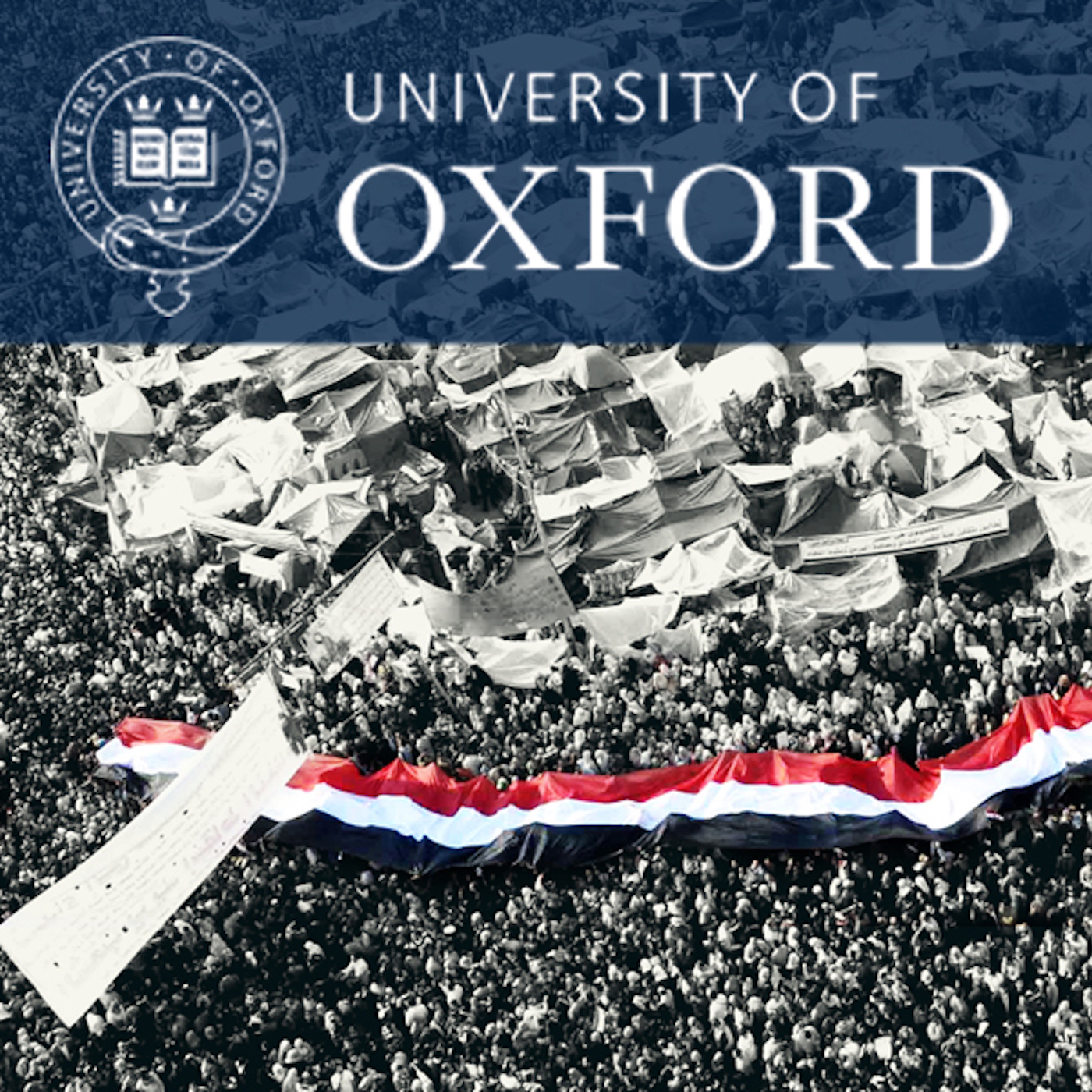Episodes
Miriyam Aouragh examines the useful and useless roles of the internet in the Arab revolutions by critically revisiting mainstream narratives on its role. Creative Commons Attribution-Non-Commercial-Share Alike 2.0 UK: England & Wales; http://creativecommons.org/licenses/by-nc-sa/2.0/uk/
Published 05/25/12
Kerem Öktem presents a critical reading of Turkish public debates and the policies of the ruling party in Turkey on the Egyptian revolution.
Published 05/25/12
Andrea Teti critiques European discourses on democracy promotion in Egypt and their alienation of Egyptian pro-democracy opposition groups. Creative Commons Attribution-Non-Commercial-Share Alike 2.0 UK: England & Wales; http://creativecommons.org/licenses/by-nc-sa/2.0/uk/
Published 05/25/12
Fred Lawson examines the reconfiguration of Egyptian foreign policy since the revolution, particularly with respect to relations with Iran and Ethiopia. Creative Commons Attribution-Non-Commercial-Share Alike 2.0 UK: England & Wales; http://creativecommons.org/licenses/by-nc-sa/2.0/uk/
Published 05/25/12
Walter Armbrust examines the 'counter-revolution' through the lens of television talk show host Taufiq 'Ukasha, a 'trickster' prone to generating perverted forms of social knowledge. Creative Commons Attribution-Non-Commercial-Share Alike 2.0 UK: England & Wales; http://creativecommons.org/licenses/by-nc-sa/2.0/uk/
Published 05/25/12
Mark Peterson examines meaning construction and the 'iterations' of Tahrir Square gatherings in the unfolding experience of the ongoing revolution. Creative Commons Attribution-Non-Commercial-Share Alike 2.0 UK: England & Wales; http://creativecommons.org/licenses/by-nc-sa/2.0/uk/
Published 05/25/12
Aya Nassar examines the imagery and negotiation of place membership unfolding in public spaces such as Tahrir Square.
Published 05/25/12
Nicola Pratt discusses the competing wars of position being waged against the hegemonic system of authoritarianism in post-Mubarak Egypt, focusing on the realm of gender.
Published 05/25/12
Alexander Kazamias conceptualises the Egyptian revolution as an incomplete process of socio-political transformation, having so far only partially changed the postcolonial Egyptian state. Creative Commons Attribution-Non-Commercial-Share Alike 2.0 UK: England & Wales; http://creativecommons.org/licenses/by-nc-sa/2.0/uk/
Published 05/25/12
Paul Amar discusses subaltern forms of sovereignty and autonomous organisation that have been emerging in Egypt since the January uprising. Creative Commons Attribution-Non-Commercial-Share Alike 2.0 UK: England & Wales; http://creativecommons.org/licenses/by-nc-sa/2.0/uk/
Published 05/25/12
Marwa Sharafeldin of Oxford University and Musawah describes her experience as a women's activist and the position of women in the Egyptian revolution through a series of slides. Creative Commons Attribution-Non-Commercial-Share Alike 2.0 UK: England & Wales; http://creativecommons.org/licenses/by-nc-sa/2.0/uk/
Published 05/25/12
Amr Salah, member of the Executive Board of the Revolutionary Youth Coalition, describes his role in the Coalition since 2011 and in the anti-Mubarak movement's organisations before the revolution. Creative Commons Attribution-Non-Commercial-Share Alike 2.0 UK: England & Wales; http://creativecommons.org/licenses/by-nc-sa/2.0/uk/
Published 05/25/12
Heba Raouf Ezzat of Cairo University reflects on the past year and the search for scholarly concepts with explanatory value in new political and social contexts. Creative Commons Attribution-Non-Commercial-Share Alike 2.0 UK: England & Wales; http://creativecommons.org/licenses/by-nc-sa/2.0/uk/
Published 05/25/12
Randa Kaldas of the American University in Cairo discusses the unfolding oral history project on the Egyptian revolution based at the American University in Cairo. Creative Commons Attribution-Non-Commercial-Share Alike 2.0 UK: England & Wales; http://creativecommons.org/licenses/by-nc-sa/2.0/uk/
Published 05/25/12
Tahia Abdel Nasser of the American University in Cairo analyses Egyptian poetry from the 2011 revolution and its role as archive and political site. Creative Commons Attribution-Non-Commercial-Share Alike 2.0 UK: England & Wales; http://creativecommons.org/licenses/by-nc-sa/2.0/uk/
Published 05/25/12
Hebatallah Salem of the American University in Cairo explains the role of political jokes and satire during the past year in Egypt. Creative Commons Attribution-Non-Commercial-Share Alike 2.0 UK: England & Wales; http://creativecommons.org/licenses/by-nc-sa/2.0/uk/
Published 05/25/12
Robbert Woltering of the University of Amsterdam examines Egyptian football supporters, the 'ultras', as political actors in the Egyptian context. Creative Commons Attribution-Non-Commercial-Share Alike 2.0 UK: England & Wales; http://creativecommons.org/licenses/by-nc-sa/2.0/uk/
Published 05/25/12
Mustapha al-Sayyid of Cairo University compares different cases in the Arab uprisings of 2011. Creative Commons Attribution-Non-Commercial-Share Alike 2.0 UK: England & Wales; http://creativecommons.org/licenses/by-nc-sa/2.0/uk/
Published 05/25/12
John Chalcraft of the London School of Economics examines horizontalist mobilisation and questions of ideological programme in the Egyptian revolution of 2011. Creative Commons Attribution-Non-Commercial-Share Alike 2.0 UK: England & Wales; http://creativecommons.org/licenses/by-nc-sa/2.0/uk/
Published 05/25/12
Adam Hanieh of the School of Oriental and African Studies considers the connection between international and regional patterns in Egypt's neoliberal order under Mubarak. Creative Commons Attribution-Non-Commercial-Share Alike 2.0 UK: England & Wales; http://creativecommons.org/licenses/by-nc-sa/2.0/uk/
Published 05/25/12
Amr Osman of the Gulf University of Science and Technology looks at the debate and consensus among Egyptian intellectuals critical of the rule of Hosni Mubarak.
Published 05/25/12
Marie Duboc of the American University in Cairo looks at the Egyptian labour movement in the years preceding the Egyptian revolution. Creative Commons Attribution-Non-Commercial-Share Alike 2.0 UK: England & Wales; http://creativecommons.org/licenses/by-nc-sa/2.0/uk/
Published 05/25/12
Reem Abou-El-Fadl, conference convener from the University of Oxford, explains the conference rationale and aims in examining the revolution 'in progress'. Creative Commons Attribution-Non-Commercial-Share Alike 2.0 UK: England & Wales; http://creativecommons.org/licenses/by-nc-sa/2.0/uk/
Published 05/25/12
Stephen Whitefield, Head of Oxford's Department of Politics and International Relations, introduces the conference in the context of the Department's existing research.
Published 05/25/12
Published 05/25/12


